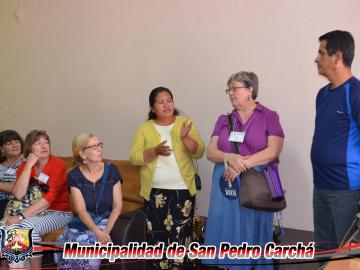By Shannon Beck
Part 2: Moving right along?
Let’s take the elevator!
Three years ago everything changed. Conversations stopped. Feelings were hurt. Trust disintegrated. Formal connections were cut between CEDEPCA (a pastoral training institute and partner of PC(USA)) and the IEPNG (Presbyterian church in Guatemala) and the Sinodica (the Presbyterian women’s group of IENPG). CEDEPCA, a forward-looking organization dedicated to working for justice for women in Guatemala, was unapologetically progressive in a culture where the femicide rate is rising. Some good church folks were not ready to rethink their theology and actions in that light. And predictably, there were personality conflicts. Theological and personal differences within the church. These conflicts threatened power structures, relationships, families. Sound familiar?
It is natural to resist change. Even the most open-minded, “let’s do something new!” cheerleaders have areas of life in which change is untenable. Institutions are particularly resistant. Take – say – the Presbyterian Church in the U.S. God knows we want to change. But then again, we don’t. We have traditions, meaningful experiences we want to duplicate, trust, a place of belonging. We do things a certain way – and there are reasons for it. If there aren’t clearly articulated reasons for something you want to change, expect a talkin’ to. Yet interpretation of what it means to be “reformed” differs vastly across this web in Presbyterianism in the U.S.
This same issue was true in Guatemala. People of good faith disagreed. It had been 3 years since these organizations were brought together.
Following in a long tradition of amazing PC(USA) mission co-workers, enter Sandi and Brian Thompson-Royer and Leslie Vogel working with the Sinodica women and CEDEPCA, respectively, providing accompaniment, support, community, education, and empowerment. And all at the request of our global partners.
The PC(USA) campaign to stop sexual violence allowed a group of women to visit Guatemala and learn from their context, encourage collaboration, and do some “holy scheming” about ways to work together to interrupt the cycles of violence.
Sexual violence has a particular context in Guatemala. Incest, especially between a step-father or uncle and daughter, is one of the main issues human rights organizations have been raising awareness about for years. Reframing the language of incest as sexual violence or rape has had an impact. In the poorer areas where poverty prevents people from education, it is a particular need.
Our workshop began with an invitation from Betty Carrera of CEDEPCA to participate in this historic moment. Women had traveled up to 24 hours on chicken buses to participate. Betty acknowledged that the only way to stop violence was to work together. And so we worked and played and prayed and studied Scripture and role played and laughed together. All but four of us had experienced some type of intimate partner violence and all of us knew someone who had experienced it. It was a day of vulnerability, of healing, a day of hope.
They would create sacred spaces in their churches, homes, and communities to welcome survivors. They would begin their own campaign in the Guatemalan Presbyterian church, but attend to garnering the support they needed from the ecclesial structures. They would educate. They would have courageous conversations.
Working for justice can bring people together. It can dissolve the walls in our hearts. It can open up the possibility that something can change in our family, in our community, in our church. We came together in solidarity, to share in pain and hope, to listen closely, and to celebrate our lives as women of faith.
But there is no “moving right along.” There is no ignoring our placating. True reconciliation requires that we don’t just “move right along.” We make steps toward each other, move into our discomfort (and how we hate it there), and accept that this is part of a mature faith and life. Whether we want it to be that way or not, God rarely works healing, forgiveness, or reconciliation in an instant. Perhaps God could do that, but we cannot.
For this gathering of women, justice work together is part of our healing. Yes, leadership changes and allows for movement, but we hold in our bodies and our memories the traumas we experience. There is no elevator to the top floor where we are fully reconciled. I wish there were.
After the event, mission co-worker Sandi Thompson-Royer shared some wise words with the women. She advised them to become equipped to attend to survivors before they headed into their world and became healers. She advised them to work together and be committed to the long haul. They were survivors themselves. It was a word of caution. Some couldn’t see it from where they were sitting, but there were several women: different indigenous women from regions across the country, ladinas (of Spanish and other decent), CEDEPCA and actors from the “story project” who had helped facilitate our work, and they grabbed hands as she spoke. As if to say, “we are in this together.” And indeed we are.

